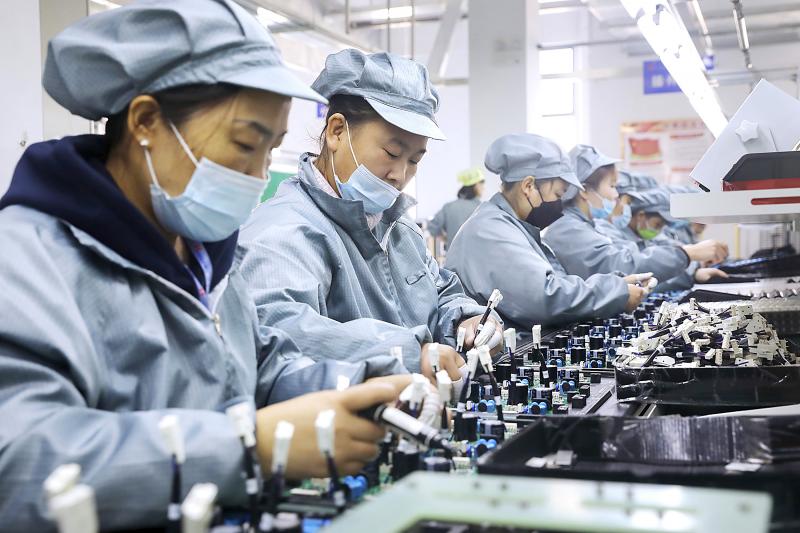A former Chinese finance minister criticized the country’s statistics for not properly reporting negative economic changes, with the rare harsh public statement from a senior figure highlighting long-standing concerns about the accuracy and reliability of national data.
A key meeting of top leaders last week said China’s growth next year would be weighed down by a “triple” whammy of contracting demand, a supply shock and weakening expectations.
However, none of those are visible in the statistical indicators, which have all been “very good,” Lou Jiwei (樓繼偉), a former Chinese minister of finance, said at an online event on Saturday.

Photo: AP
“There are insufficient figures reflecting negative changes” in the economy, Lou said, adding that the one-sided data make it harder to assess the government’s current judgment on the “triple forces” overshadowing the economy.
“In contrast, the US has both positive and negative numbers,” he said.
While the Chinese government touts the increase in the number of companies and other market entities, despite the COVID-19 pandemic, it has not publicized that a large number of these are inactive due to business woes and the difficulty of canceling official registrations, Lou said.
Similarly, government statistics count new jobs created, but do not follow up on whether those people are then laid off after six months or more, he said.
Lou is well-known as an outspoken and forthright commentator on the economy. After serving as finance minister, he headed the national pension fund until 2019.
Economists, as well as Chinese government officials, have repeatedly raised questions about the accuracy of the nation’s economic data over the years. After a series of scandals about faked data, a special unit was set up to combat the issue, with Chinese National Bureau of Statistics Director Ning Jizhe (寧吉喆) saying in 2018 the problems were all in the past.
Ning spoke at the online forum on Saturday just before Lou made his comments.
Although China’s statistics do look to have improved in recent years as national authorities take over more responsibility for data collection, doubts remain, with issues such as the steadiness of growth statistics or discrepancies between national and local numbers continuing to raise questions about accuracy.
The most important word for Chinese economic policy next year is “stability,” according to a senior economic official of the Chinese Communist Party (CCP).
There are many hidden risks in the economy and the financial sector, and China cannot return to the old growth path, Han Wenxiu (韓文秀), executive vice minister of the CCP’s Central Financial and Economic Affairs Commission, said in an online event on Saturday.
Han was explaining the economic plans for next year, which the CCP released on Friday.
The property sector is large, has a long supply chain, and accounts for a high proportion of the economy, fixed-asset investment, local governments’ income and financial institutions’ loans, Han said.

Taiwan Semiconductor Manufacturing Co (TSMC, 台積電) would not produce its most advanced technologies in the US next year, Minister of Economic Affairs J.W. Kuo (郭智輝) said yesterday. Kuo made the comment during an appearance at the legislature, hours after the chipmaker announced that it would invest an additional US$100 billion to expand its manufacturing operations in the US. Asked by Taiwan People’s Party Legislator-at-large Chang Chi-kai (張啟楷) if TSMC would allow its most advanced technologies, the yet-to-be-released 2-nanometer and 1.6-nanometer processes, to go to the US in the near term, Kuo denied it. TSMC recently opened its first US factory, which produces 4-nanometer

GREAT SUCCESS: Republican Senator Todd Young expressed surprise at Trump’s comments and said he expects the administration to keep the program running US lawmakers who helped secure billions of dollars in subsidies for domestic semiconductor manufacturing rejected US President Donald Trump’s call to revoke the 2022 CHIPS and Science Act, signaling that any repeal effort in the US Congress would fall short. US Senate Minority Leader Chuck Schumer, who negotiated the law, on Wednesday said that Trump’s demand would fail, while a top Republican proponent, US Senator Todd Young, expressed surprise at the president’s comments and said he expects the administration to keep the program running. The CHIPS Act is “essential for America leading the world in tech, leading the world in AI [artificial

REACTIONS: While most analysts were positive about TSMC’s investment, one said the US expansion could disrupt the company’s supply-demand balance Taiwan Semiconductor Manufacturing Co’s (TSMC, 台積電) new US$100 billion investment in the US would exert a positive effect on the chipmaker’s revenue in the medium term on the back of booming artificial intelligence (AI) chip demand from US chip designers, an International Data Corp (IDC) analyst said yesterday. “This is good for TSMC in terms of business expansion, as its major clients for advanced chips are US chip designers,” IDC senior semiconductor research manager Galen Zeng (曾冠瑋) said by telephone yesterday. “Besides, those US companies all consider supply chain resilience a business imperative,” Zeng said. That meant local supply would

BIG INVESTMENT: Hon Hai is building the world’s largest assembly plant for servers based on Nvidia Corp’s state-of-the-art AI chips, Jalisco Governor Pablo Lemus said The construction of Hon Hai Precision Industry Co’s (鴻海精密) massive artificial intelligence (AI) server plant near Guadalajara, Mexico, would be completed in a year despite the threat of new tariffs from US President Donald Trump, Jalisco Governor Pablo Lemus said. Hon Hai, also known as Foxconn Technology Group (富士康科技集團), is investing about US$900 million in what would become the world’s largest assembly plant for servers based on Nvidia Corp’s state-of-the-art GB200 AI chips, Lemus said. The project consists of two phases: the expansion of an existing Hon Hai facility in the municipality of El Salto, and the construction of a